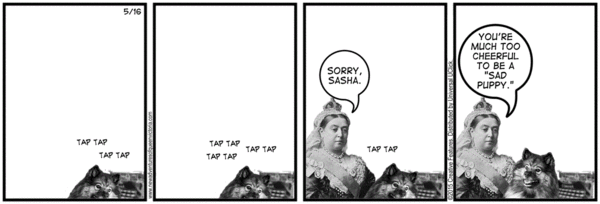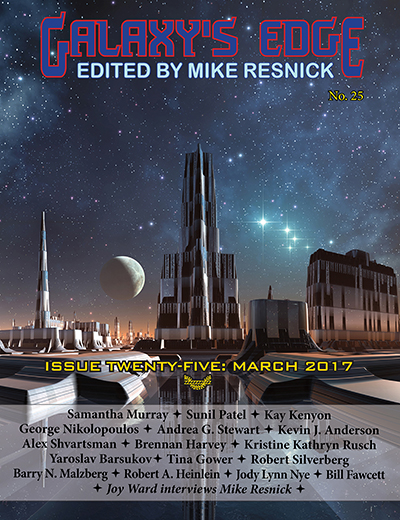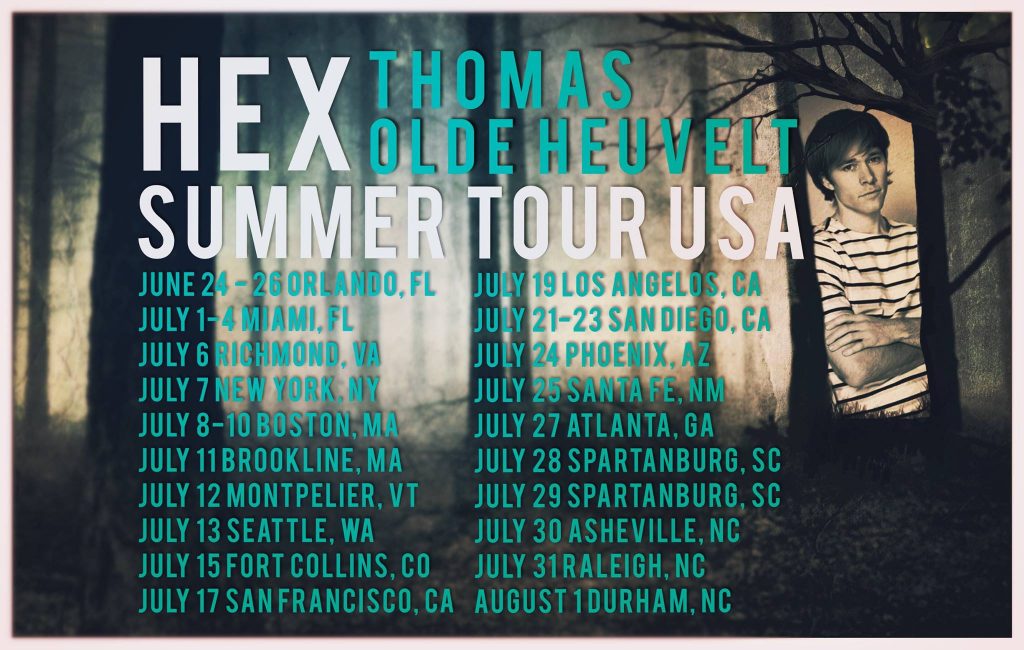aka An alternate dimension based on String Theory.
Vox Day, Lela E. Buis, Bob Nelson, Jack Hastings, Floris M. Kleijne, Martin Wisse, John Scalzi, Brian Niemeier, Steve Green, Bruce Arthurs, Ampersand, Immanuel Taal, Lis Carey, Larry Correia, Spacefaring Kitten, Elisa Bergslien, Brandon Kempner and Pip R. Lagenta and Pab Sungenis. (Title credit belongs to File 770’s contributing editors of the day Laura Resnick and John King Tarpinian.)
Vox Day on Vox Popoli
“#GamerGate has more fun” – May 16
#GamerGate has got to be the first consumer revolt that managed to bring together unequivocally evangelical Christians, unabashed porn stars, and undeniably fabulous homosexuals. Among many, many others. How evil are the SJWs, how universally loathsome is their ideology, that it can inspire such diverse tribes to unite against them? We need a word to describe anti-SJWism. Then again, I suppose we’ve already got one. And that word would be “freedom”.
Lela E. Buis
“Establishing a brand with controversy” – May 16
Before this month, how many people had heard of Theodore Beale (aka Vox Day)? Come on, let’s have a show of hands. Nobody? Same here. I had never heard of the man. Somehow his accomplishments had escaped my notice. However, he is on the national radar now, as he has managed to subvert the Hugo Awards. Not only has he received two nominations for his own work, but his publishing house has won nine nominations. He accomplished this through a political and financial campaign that took advantage of how the awards are run.
Bob Nelson
“Hugos, Sad Puppies and The Game of Thrones” – May 16
The Baen Books website includes a forum called Baen’s Bar. I was banned for not agreeing with Mr Ringo’s vision of the universe. That really pissed me off, because I had in fact bought several of his early books, before he went completely wingnut… In fact, I bought books by just about every one of Baen’s considerable stable. Eric Flint is still a favorite of mine.
Which brings us to Sad Puppies… this time for real.
A couple years ago, a Baen writer named Larry Correia, on the belief that the Hugo Awards had been kidnapped by radical left-wingers whom he calls “Social Justice Warriors”, decided to recruit enough John Ringo True Believers to effectively take control of the Hugo Award ballot process. This year, his successor at the head of the Sad Puppies movement, Brad Torgerson, was brilliantly successful. The Ringo Faithful successfully packed the nominating process, ensuring their victory in the final voting. Baen authors won everything.
I am a Vietnam vet. That war was epitomized by a young lieutenant’s phrase, “We had to destroy the village to save it.” The Sad Puppies had to destroy the Hugo to save it. It is not clear whether the Hugo Awards will ever carry the kind of aura that they had before the Sad Puppy coup d’état.
Jack Hastings on Half-Forgotten
“The Great Hugo Kerfuffle of 2015” – May 16
Disclaimer
Let it be said at the outset that I am an armchair socialist who very much dislikes Tea Party apparatchiks, Fox News demagogues, religious zealots, Rush Limberger and the Sad and Rabid Puppies who have mounted a campaign to hijack Science Fiction Fandom’s Hugo Awards. Furthermore, I am not going to provide links to any of Correia’s, Torgersen’s or Beale’s (the Sad and Rabid Puppies, see below) web posts because I don’t have to and that’s what Google is for anyway. You’ll just have to trust me that the quotes provided are accurate and not taken too far out of context. You can do that, can’t ya?
Floris M. Kleijne on Barno’s Stables
“The Modified No Award Proposal: SPUNARPU” – May 15
To put it bluntly: I accept Brad Torgersen’s Sad Puppies, and I reject their Rabid cousins. And to put my money where my mouth is, I’m proposing the SPUNARPU voting approach: Sad PUppies, No Award, Rabid PUppies.
What does that mean in practice? I will read/watch/listen to all nominated works and artists that were either on the Sad Puppies slate (regardless of their presence on the Rabid slate), or on neither slate. I will neither peruse nor vote for works and artists that were only on the Rabid Puppies slate.
Therefore, my amended SPUNARPU approach to this year’s Hugo vote is thus:
- Slush-peruse (read, watch, listen until I’ve had enough) all nominated works and artists except the ones slated by Vox Day and his Rabid Puppies.
- Vote for the works and artists I believe are Hugo-worthy in order of how much I think of them.
- If voting slots remains, put No Award
- If voting slots still remain, vote for the works and artists I believe are not Hugo-worthy below No Award, in order of how little I think of them.
- If voting slots remain even after this exercise, put the Rabid Puppies nominees in there.
This approach minimizes the chance of works and artists slated by Vox Day and not by Brad Torgersen winning a Hugo
Martin Wisse on Wis[s]e Words
”Puppy-Proofing the Hugos” – May 16
LonCon3 had over 10,000 members: get all those to nominate and slate buying becomes slightly more expensive. But how do you get them to vote? Once LonCon3 was over, it was up to Sasquan to rally voters, but that only started in January, or four months later, far too late for those not into core Worldcon fandom to remember to nominate. What’s needed therefore is for the nomination process to open earlier, something which the WSFS rules don’t say anything about, so which can be done without needing that lengthy rule changing process. And while it is easier for a Worldcon to only start considering nominations in January, I think this is important enough to justify that added difficulty.
What I would like to see is having electronic nomination ballots open as soon as possible, either in January of the eligible year (e.g. January 2015 for 2016 nominations) or, if that’s too confusing, too much of a hassle, perhaps after the previous Worldcon has finished (September 1 for the most part). That way it also becomes easier for those already involved to keep a running tally for the year. It would also need not just opening the nominations, but promoting the nomination process as well. Get the members of the previous Worldcon involved, get them enthusiastic about nominating. It’s something next year’s Worldcon, MidAmeriConII, could start up already.
John Scalzi on Whatever
“Reader Request Week 2015 #10: Short Bits” – May 16
Noblehunter: “What are your thoughts on bad actors in anarchic/unorganized social movements? From looters hi-jacking civil rights protests to gamergate (some people seem to actually believe it’s about ethics in video game journalism) and Puppies (likewise), the stated goals of the group are undermined or by those calling themselves members of the group while acting in counter-productive ways. Can these groups police themselves despite a lack of central authority? Do you have any suggestions for people who are genuinely concerned about ethics in videogame journalism or other populist causes?”
Well, I’d first note that in the cases of Gamergate and the Puppies, the “stated goals” of the group were tacked on as afterthoughts/justifications for the precipitating action (harassment of women — and of a specific woman — in the case of Gamergate, personal desire for a bauble in the case of the Puppies). That’s not an insignificant thing, and it’s not something the fig leaf of a “stated goal” is going to cover up. This is a different situation, obviously, than looters attaching themselves to a protest movement already underway.
If I were truly interested in ethics in video game journalism — which is a laudable goal — or in seeing more representation of the sort of SF/F subgenres I liked in awards — less concretely laudable, but sure, why not — or whatever, I would probably start fresh, far away from those already tainted movements.
Brian Niemeier on Superversive SF
“Transhuman and Subhuman Part IV – Science Fiction: What Is It Good For?” – May 16
According to Wright, the end of science fiction and fantasy’s exile was decreed by the advent of a single film: George Lucas’ cultural juggernaut Star Wars. “When…the President of the United States can make casual references to Jedi mind-powers or the One Ring from Mordor, then space opera and fantasy epic have sunk into the marrow bones of the popular imagination.”
Having examined how genre fiction’s banishment came about, and how it ended, Wright turns to the questions of where sci-fi is going, and what it’s for.
Steve Green
My latest mug/t-shirt/poster/tattoo design. As a republican, I’d rather not have included the crown, but it’d look odd otherwise.
THIS SPACE INTENTIONALLY LEFT BLANK
ED COX DOODLE HERE
Bruce Arthurs on Undulant Fever
“Mad Libs: Sad Puppies Edition” – May 16
The Wall Street Journal published a recent story about the Sad Puppies/Rabid Puppies gaming a vulnerability in the Hugo Awards nomination procedure to almost completely dominate the 2015 ballot with their own, ah, particular point of view. I was reading the comments (yes, I should know better than to read comments on posts about this subject by now; doing so mostly just raises my blood pressure)….
Ampersand on Alas
“In Which Amp Realizes That Two Arguments That Frustrate Me Are Actually The Same” – May 16
As regular readers know (and by “know,” I mean, “are probably sick of hearing”), I’m against it when folks organize to economically punish others for their political views.
Very frequently, when I write or talk about this, I’ll run into some fellow lefty1 who doesn’t see any substantive difference between an organized boycott or blacklist against (say) hiring Orson Scott Card, and an individual reader choosing not to buy Card’s books.
Then I realized that one of the Sad Puppy/Rabid Puppy arguments about the Hugo awards that I find most frustrating, is really the exact same argument. One side is saying that collective organization – be it an anti-OSC petition or slate voting – is substantively different than individuals making individual decisions. The other side is denying that there’s any meaningful difference.
Immanuel Taal on Medium
“An Ode To Flatland” – May 16
Good Science Fiction answers a “what if” question with the guiding hand of its author. A good social message that grows naturally out of this story can help make the setting that much more rich, the characters that much more realistic, and the themes that much more intriguing. But a good social message imposed on a story contrived to push the author’s social views is bad Science Fiction. It comes down to the “science” part of Science Fiction. Good science starts with evidence and reaches conclusions. Good Science Fiction starts with imaginary evidence and reaches imaginary conclusions. Bad science and bad Science Fiction alike start with the conclusion and try to support it with flimsy (and often imaginary) evidence. The author has complete control over their created world and the social message, if any, they wish to convey. If that world doesn’t naturally grow to show the message it’s probably a boring world and a weak social message.
Lis Carey on Lis Carey’s Library
“The Journeyman: In the Stone House, by Michael F. Flynn” – May 16
Structurally, this isn’t a bad story. The plot is a little thin, with much of the little that happens relying on events in the prior story.
Spacefaring Kitten on Spacefaring, Extradimensional Happy Kittens
“’The Journeyman: In the Stone House’ by Michael F. Flynn” – May 16
The main character is an adventurer who has been adventuring in some earlier Analog story as well. He isn’t terribly interesting in any way, and nothing of interest happens in the story, so I was left wondering what was the point, really. There’s some military training, sword-fighting and snappy dialogue that is meant to be smart-ass (I guess).
I didn’t enjoy it at all and have trouble seeing why it’s on the ballot.
Elisa Bergslien on Leopards and Dragons
“A peak into The Goblin Emperor” – May 15
The one ‘fun’ thing I have managed to do in the past few weeks is to start reading works nominated for a Hugo award. All of the short works I have read so far have ranged from meh down to yuck! Thankfully the novel category has some lovely rays of light. I have been reading The Goblin Emperor by Katherine Addison and greatly enjoying it.
Brandon Kempner on Chaos Horizon
‘Hugo Award Nomination Ranges, 2006-2015, Part 5” – May 16
Let’s wrap this up by looking at the rest of the data concerning the Short Fiction categories of Novella, Novelette, and Short Story. Remember, these stories receive far fewer votes than the Best Novel category, and they are also less centralized, i.e. the votes are spread out over a broader range of texts. Let’s start by looking at some of those diffusion numbers:
Pip R. Lagenta on Facebook – May 16
First Sad
My Hugo burns at both ends.
It will not last the night.
But ah, my foes, and oh, my friends—…
Those Puppies are a blight

https://twitter.com/yetregressing/status/599620774081728512



